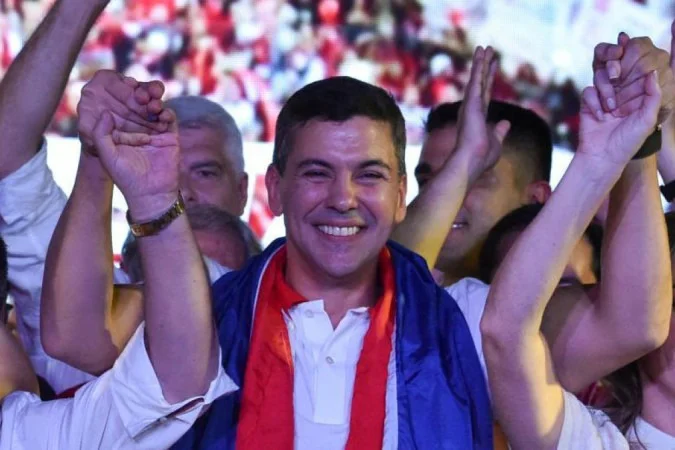The overwhelming victory of economist Santiago Peña in the presidential elections in Paraguay on Sunday (30) has slowed the left’s advance in Latin America and consolidated the power of the conservative Colorado Party.
It secured a majority in the Senate and governorships in 15 of the nation’s 17 departments.
Peña, 44, won by a wide margin over liberal Efraín Alegre, the candidate of a coalition of various opposition parties who also failed in his third attempt to win the presidency.

With 99.94% of polling stations counted and a 63.24% turnout, Peña and his vice presidential candidate Pedro Alliana received 1,292,079 votes (42.74%), according to data from the Preliminary Election Results Transmission (TREP) system.
For his part, Alegre received 830,842 votes (27.48%) in the election, which was held in a single round.
One of the day’s surprises was the independent and anti-establishment candidate Paraguayo Cubas, who received 22.91% of the vote (692,663 votes) with the support of the National Crusade Party.
Peña will replace Paraguay’s current president, Mario Abdo Benítez, also of the Colorado Party.
His predecessor in office was Horacio Cartes (2013-2018), the current leader of the Colorado Party – or National Republican Association (ANR) – and considered the political mentor of the future head of state.
Colorado’s triumph in Paraguay breaks a leftist trend that returned to the region with the electoral victory of Gabriel Boric in Chile, Gustavo Petro in Colombia, and Luiz Inácio Lula da Silva in Brazil.
Moreover, this is the first time since 2019 that voters have not punished a party in power, said Daniel Zovatto, regional director of the International Institute for Democracy and Electoral Assistance (IDEA).
A CALL FOR UNITY
In a speech to hundreds of ruling party supporters, Peña celebrated his victory, calling for unity and announcing his intention to address social inequalities and asymmetries, but without naming specific measures of his future government.
“I call for unity and consensus to achieve our goal of collective well-being and prosperity without exclusion.”
“It is time to put aside our differences to prioritize the common concerns that unite us as a nation,” he said.
“Starting tomorrow (Monday), we will begin to shape the Paraguay we all want without gross inequalities or unjust social asymmetries.”
He added that the task ahead is “not just for one person or one party” after “the last few years of economic stagnation, budget deficit, with a worrying unemployment rate and an increase in extreme poverty.”
In Sunday’s election, in which nearly 4.8 million citizens were called to vote for senators, representatives, governors, and council members, the Colorado-National Republican Association (ANR) party received a 43.75% majority in the upper house.
THE FIGHT CONTINUES
The big loser of the day was Alegre, who had already been defeated by Horacio Cartes in 2013 and Mario Abdo Benítez in 2018.
“We will not give up; we are not the kind of people who give up. The struggle continues,” Alegre said in a brief statement to the press from his residence in Lambaré, near Asunción.
“The message is very clear, the citizenry clearly shows us that we are the majority, but we must be united,” he added.
The candidate of Concertación, a heterogeneous political conglomerate with formations of the right, center, and left, described it as a priority to “move forward in finding formulas that will allow us to continue fighting.”

